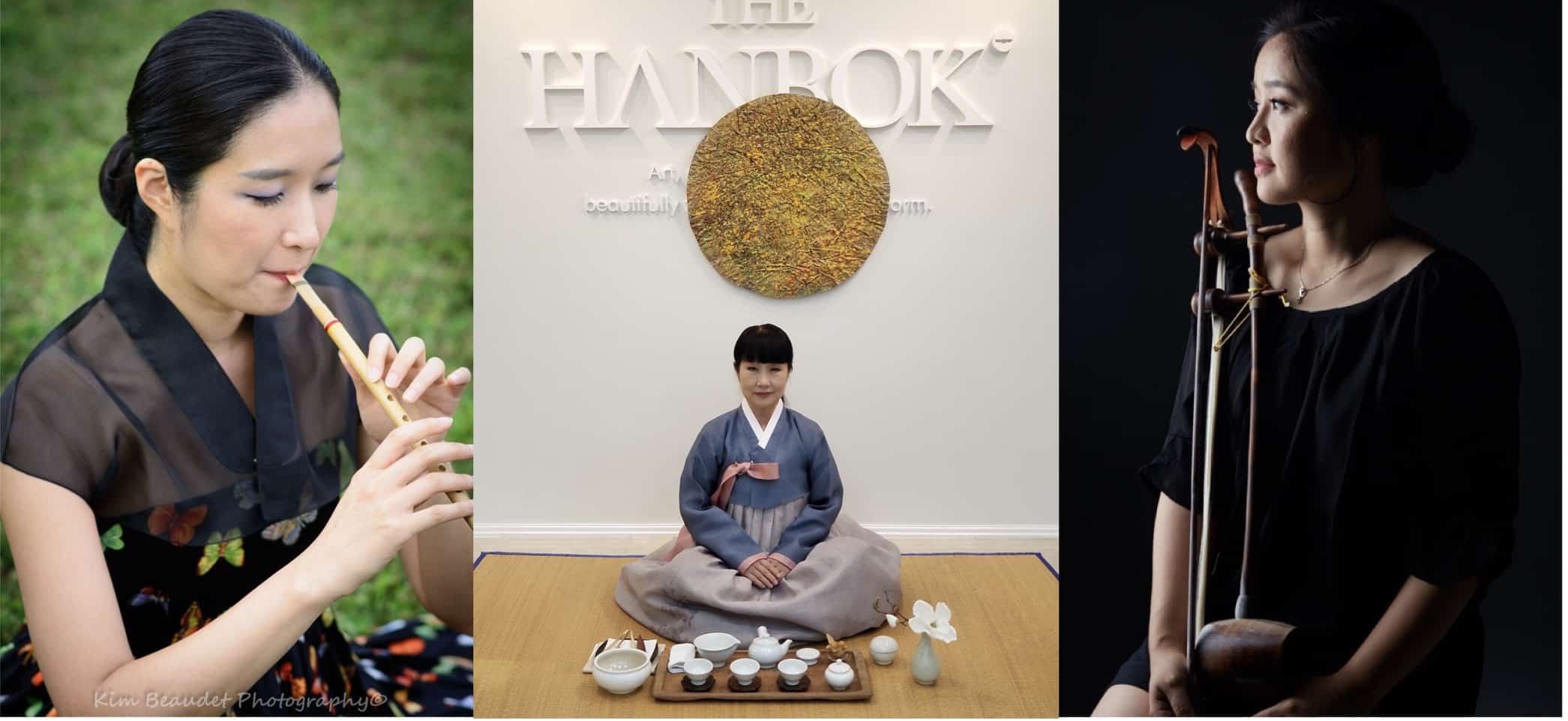
- This event has passed.
Crossing Boundaries Concert Series Vol. 3: 7 word chanting 靈山會相 and tea ceremony
November 9日, 2018 @ 8:00 pm - 9:15 pm UTC+0
$25
CRS (Center for Remembering & Sharing) presents 7 word chanting Yeongsanhoesang 靈山會相, featuring Korean traditional music performed by gamin (piri, saenghwang) and Min Kyung Park(haegeum) accompanied by a tea ceremony performed by Korean tea master Sei-Ryun Chun. Following the performance, there will be a short talk about Korean tea ceremony and Q&A with the artists.
For this event, which is Vol. 3 of the Crossing Boundaries — Echoes of Korea — Concert Series curated by gamin, she would like to introduce the Korean concept of Pungnyu, which is defined as an artistic form of recreation incorporating elements of nature, life, and art. Pungnyu is intrinsic to a tasteful lifestyle and to Koreans’ collective and individual entertainment culture. It literally means “streams of wind.” Sharing tea, playing music, writing, and observing the changing of the seasons are traditional pastimes used for transcending the material or secular aspects of life and cultivating a peaceful mind. Participating in a tea ceremony quiets the mind and opens the senses, allowing us to experience more of the subtlety and depth of the music performance.
Both the music and tea ceremony presented in this program have been handed down to us from medieval Buddhist practices. As Buddhism in Korea fell in and out of favor through the centuries, both the music and the tea ceremony were frequently revised to serve the times. Artists today continue to find ways to explore and extend these traditional art forms in ways that speak to the present moment and connect us not only to our heritage but to one another.
Tickets are $25 and are available online, by phone (212-677-8621), and at CRS. Students/seniors with valid ID are $15 at the door.
CROSSING BOUNDARIES — ECHOES OF KOREA, curated by gamin (piri, taepyeonso, saenghwang), provides musicians from Korea with space to experiment with the new, to collaborate across genres, cultures and disciplines, and to explore new ways of using creative communication to facilitate a shared practice of presence. The goal is to dissolve boundaries between performers and audiences, the traditional and contemporary, classical and experimental, Korea and the world. Participants in the series are encouraged to incorporate meditation, improvisation, and collaborations with visual and movement-based artists as well as musical artists from different traditions.
About the Program
Tea ceremony by Sei-Ryun Chun
Piri & saenghwang played by gamin
Haegeum played by Min Kyung Park
Originally a vocal piece with lyrics drawing on the words of the Buddha’s sermon in Mount Yeongsan, India, Yeongsanhoesang became purely instrumental in the 15th century. The music has undergone continuous change with the current version taking form sometime in the 19th century. There are many versions of the suite, which typically includes 8–9 pieces. While the genesis of the suite is not completely certain, the first piece of the suite, “Sangryeongsan” appears to be the foundation for the suite. The following pieces in the suite include variations on “Sangryeongsan,” as well as standard musical forms and dance pieces of the Joseon era (1392-1910). “Sangryeongsan,” the slowest and longest piece in the suite, progresses gracefully and gently like the flow of water.
The Korean tea ceremony is distinguished by its emphasis on preparing and enjoying tea with a natural manner and minimum of ritualized formality. Originally, it was directly connected with Buddhist practices, but today it can be enjoyed by everyone. Cha (tea) was introduced to Korea around the 6th or 7th century from China. Some Korean scholars or Buddhist monks who traveled to China probably brought tea with them and began to drink in Korea. In the Goryeo dynasty (918-1392), Korean tea culture became popular with the rise of Buddhism as a national religion. During the Joseon Dynasty (1392-1910), the Korean tea culture declined as Confucianism replaced Buddhism as a spiritual mainstream. Buddhism was repressed and became separated from the public. In the early 19th century, a leading Korean philosopher, Dasan Jeong Yakyong (1762-1836), and the Korean Buddhist Seon (Zen) master Chou Uisun (1786-1866), known as the “Father of Korean Tea,” played key roles in reviving the long lost Korean tea tradition, which continues today.
About the Artists


